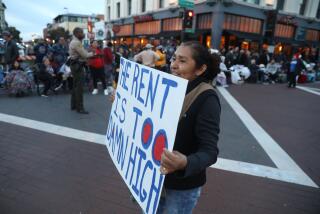L.A. Mayor Garcetti jumps on the income inequality bandwagon
Judging from the trends in political rhetoric, “income inequality” has become the new “poverty.”
The latest example comes from a piece by my colleague Michael Finnegan in Monday’s edition of The Times, in which Los Angeles Mayor Eric Garcetti throws his support behind a proposal to raise the minimum wage at large hotels to a little more than $15 an hour.
In the old days, such a proposal would be heralded as a way to lift working people out of poverty. (OK, not just the old days -- that appears to be the stance taken by Councilmen Curren Price and Mike Bonin.) And critics would argue that it would have the opposite effect, pushing more people into poverty by causing layoffs and shrinking the number of jobs available for the young and unskilled.
But Finnegan reported that Garcetti sees the minimum-wage increase as a prong in his larger plan to address income inequality, which also includes a summer jobs program for young Angelenos, more vocational training and better access to healthcare.
All of those efforts may, in fact, help pull more people out of poverty. And that should be a top priority for city leaders, considering how outsized the poverty problem is here.
But income inequality is a different issue. It’s not so much about making the poor less poor but about changing the way the economy distributes gains. A very large percentage of the income in the U.S. is being collected by a very small percentage of the population; in 2012, 1% of the households (1.2 million, which translates to a little more than 3 million people) took in about 23% of U.S. income. The top 10% of U.S. households amassed about 50% of the income.
Those numbers were compiled from IRS data by Emmanuel Saez at UC Berkeley. Saez’s research also shows that, since the 1990s, the incomes of the top 1% have grown far, far faster than everyone else’s when the economy was expanding, and fell much, much faster when the economy was in recession.
The data strongly suggest that a major factor in the rising inequality isn’t wages, it’s investment income. And to some extent, that’s an unintended consequence of public policy. Pushed by shareholders and changes in tax law, publicly traded companies have paid top executives increasingly in ways that are linked to the performance of the company’s stock -- for example, by making stock options a big part of the compensation package. Some towering pay packages have resulted.
But I digress. To really address income inequality, policymakers have to start by improving upward mobility. That means help more people climb out of no-skill, entry-level jobs, rather than just making those jobs pay better.
The other half of the equation -- the controversial half -- is taking steps to prevent the highest-paid Americans from capturing an ever-increasing percentage of the income generated. Part of the challenge is figuring out how to ensure that more of the gains created by increased productivity actually flow to the workers who are being more productive.
One might argue that forcing hotels to pay higher wages will do just that. But that would be true only if the hotel owners took the pay increase straight out of their profits, rather than adjusting their businesses to maintain their profit margins (for example, by charging higher prices). Which outcome seems more likely?
Garcetti is hardly the only pol trying to ride the populist wave -- watch President Obama’s State of the Union address Tuesday for another example. And cynics would argue that the hotel pay proposal is really just a favor for local unions, which have pushed for higher minimum wages at the workplaces they’ve been unable to organize. Still, it’s telling that Garcetti thinks it would be easier to sell the hotel wage measure by waving the income inequality flag instead of calling it what it really is: an effort to lift a small portion of the local workforce out of poverty, probably at the expense of people who don’t live here.
ALSO:
Rail alone can’t reinvent L.A.
California’s drought, times three
Follow Jon Healey on Twitter @jcahealey and Google+
More to Read
A cure for the common opinion
Get thought-provoking perspectives with our weekly newsletter.
You may occasionally receive promotional content from the Los Angeles Times.







